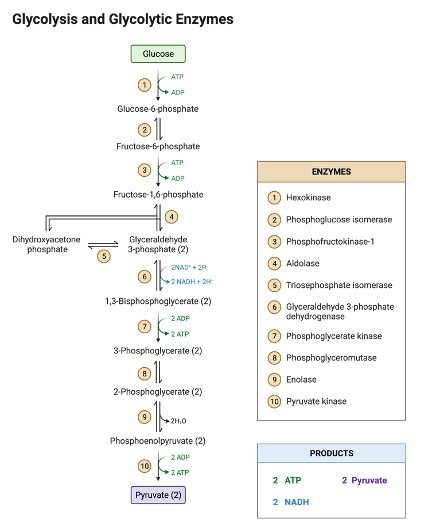Category: Uncategorized
-

Lactate Dehydrogenase: Definition, Types, & Examples
Continue ReadingLactate Dehydrogenase Definition
Lactate Dehydrogenase is an enzyme, converts the end product of glycolysis i.e., pyruvate into lactic acid and is found in all most every organism. This process utilizes one NADH that is the energy transferring molecule. As a result, it generates NAD+, which allows the glycolysis pathway to continue.

What is Lactate Dehydrogenase?
Lactate conversion is essential in hypoxic or anaerobic conditions in the cell when there is no availability of oxygen. For the production of ATP, the cell is dependent on the glycolysis pathway only in less availability of oxygen.
This pathway requires the continual input of NAD+ to generate ATP. Lactate Dehydrogenase enzyme catalysis fermentation reaction leading to the formation of lactic acid that is responsible for the burning or muscle cramps in muscle cells during intensive exercising. The most important product of this pathway is electron carriers NAD+.

Lactate Dehydrogenase enzyme is found in all cells of the human body where it works to maintain homeostasis when hypoxic conditions occur. In the process of exercising the oxygen level within the muscles is depleted. Without the presence of oxygen that functions as the final electron acceptor in ETC, ATP synthesis drops.
For the muscle cells to work ATP is required for this they become dependent on glycolysis in absence of oxygen. But glycolysis pathway requires the supply of electron carriers to function and produce ATP.
Lactose dehydrogenase enzyme catalysis is the removal of electrons from NADH to produce NAD+ that is employed in the glycolysis pathway. ATP production is less in this pathway when compared to ETC, but it helps the cells to work and generate energy even in absence of oxygen.
Lactate Dehydrogenase Function
i. Producing Energy Without Oxygen
While the process of oxidative phosphorylation in the mitochondria produces the most energy, some energy is produced by the breakdown of glucose into pyruvate. This process, glycolysis, requires NAD+ but produces ATP. The cell can use this small amount of ATP to keep the cell operating until oxygen returns.
Instead of using the pyruvate in the Krebs cycle, the pyruvate is converted to lactic acid via lactate dehydrogenase. This process regenerates NAD+, which is needed to continue glycolysis. Continuing glycolysis produces a small amount of ATP, which allows the cell to survive.
ii. Converting Lactic Acid into Energy
When the level of oxygen is back to normal, the enzymatic function of this enzyme is reversed. That will lead to the production of pyruvate that can then move to mitochondria and be broken down releasing a large amount of ATP.
Even simple exercises may cause a lack of oxygen in some tissues, but the presence of lactate dehydrogenase ensures the supply of ATP. But this causes increased concentration of lactic acid in muscles that can cause the burn that some experience. When oxygen again rushes to these tissues, this sensation will subside.
Lactate Dehydrogenase Test
As lactate dehydrogenase only acts in absence of oxygen it can be employed to analyze tissue damage and its extent. For example, people who recently had a heart attack will have high quantities of this enzyme in their blood that has been released from damaged tissues like heart tissue in this case.
By testing the enzyme form, they can determine the type of enzyme as different tissues produce a different type of this enzyme. If the enzyme is LDH-1, it indicates that the enzyme is from heart tissue. Depending on its level in spinal and blood fluid, the intensity of damage can be ascertained and the period of the trauma can also be determined.
It can also serve as a diagnostic tool for other kinds of diseases like monitoring internal tissue damage, certain cancer treatment evaluation, and monitor conditions. It can be utilized with other kinds of tests to analyze the damage better. The most significant indicator is the level of LDH in blood and its type.
Lactate Dehydrogenase Level in Human Population
Newborn babies have a high level of LDH in their blood, which measures up to 450 units per liter. This level decreases as children age, in the case of infants it is 250 U/L, while in the case of children it declines to 170 U/L.
In a normal healthy adult, the level of this enzyme is 200 U/L. A level higher than this indicates tissue damage. The spinal fluid has a level of 40-70 U/L of LDH, a rise beyond this level indicates bacterial infections.
The treatment of cancers can be monitored by the amount of LDH in the blood. This can help the doctors understand if therapies like chemotherapy are working on the correct tissue.
This test can also be employed for anemia, meningitis, encephalitis, pre-eclampsia, HIV, identify hypothyroidism and liver disease. The presence of isoforms of LDH makes it an excellent diagnostic measure as the tissue damaged can be identified.
Lactate Dehydrogenase Isoforms
This enzyme comprises 4 hetero-subunits that work as a unit. These 4 subunits are encoded by different genes and have different structures. Five different isoforms can be observed in the case of humans that are primarily located in different tissues.
Due to these isoforms, it is easy to identify the tissue that produced this enzyme. For example, LDH-1 isoform is found in tissues of the brain, blood cells, and the heart. While LDH-3 form is seen in the case of lungs.
Commercial Uses of Lactate Dehydrogenase
It is also a commercial enzyme that is utilized to create many dairy products like kefir, yogurt, and cottage cheese. It is the enzyme responsible for making milk sour. It is employed by wineries and brewers to give a characteristic sour taste to their wine or beer. This sour taste is attributed to the production of lactose.
Lactate Dehydrogenase Citations
- Elevated lactate dehydrogenase (LDH) can be a marker of immune suppression in cancer: Interplay between hematologic and solid neoplastic clones and their microenvironments. Cancer Biomark . 2017 Jul 4;19(4):353-363.
- Lactate Dehydrogenase Inhibition: Biochemical Relevance and Therapeutical Potential. Curr Med Chem . 2019;26(18):3242-3252.
- Lactate dehydrogenase A: A key player in carcinogenesis and potential target in cancer therapy. Cancer Med . 2018 Dec;7(12):6124-6136.
- Images are created with BioRender.com
Share
Similar Post:
-

Thymine: Definition, Structure, & Function
Continue ReadingThymine Definition
Thymine is a pyrimidine base having the formula C5H6N2O2 that pairs complementary with adenine via 2 hydrogen bonds in the DNA molecule.
What is Thymine?
Nucleotides form the fundamental monomers that comprise the polymer of nucleic acids like DNA. Each nucleotide is formed of 3 sub-units: pentose sugar, phosphoric acid, and a nitrogenous base.
Nitrogenous bases include There are five nucleobases that serve as fundamental units of the genetic code: thymine, adenine, cytosine, guanine, and uracil. These nucleobases are grouped into purines and pyrimidines.
Thymine like other pyrimidines has a heterocyclic aromatic ring and has a molar mass of 126.115 g/mol. It has a melting point of 316- 317 °C. It forms the component of occurring as a component of a nucleoside or a nucleotide.
It forms the part of nucleobases in the case of DNA but it is absent in RNA and uracil is present instead. Uracil and thymine both pair complementary with adenine.
Thymine vs Uracil
Thymine, cytosine, and uracil are pyrimidine nucleobases. Thymine is distinct from other pyrimidine bases in having in 5th position a methyl group and 2 keto groups at positions 2 and 4 in the heterocyclic ring. Thymine pairs with adenine with 2 hydrogen bonds.
Uracil has a similar structure to thymine and it only differs in terms of a methyl group at the 5th position in the heterocyclic ring. One of the possible explanations why DNA has thymine instead of uracil can be due to stability.
Cytosine another pyrimidine gets readily deaminated into uracil by losing an amine group. This defect is sensed and corrected by repair systems in DNA before a mutation could occur.
If uracil was present as a pyrimidine base in DNA, the repair system may fail to differentiate between deaminated cytosine turned uracil and the original uracil.
Cytosine in the 2nd position has a keto group and an amine group at position 4 in the pyrimidine ring and the formula C4H5N3O. Cytosine complementary bonds with guanine via 3 hydrogen bonds in both RNA and DNA.
Biosynthesis of Thymine
Thymine biosynthesis, like other pyrimidines, is initiated by the formation of carbamoyl phosphate. It forms in a reaction catalyzed by carbamoyl phosphate synthetase that involves ATP, glutamine, water molecules, and bicarbonate.
In a series of steps, the carbamoyl phosphate is first converted into carbamoyl aspartate that then yields dihydroorotate. It undergoes oxidation to yield orotate that then gets converted into orotidine-5-monophosphate (OMP).
OMP on decarboxylation generates uridine monophosphate (UMP). Finally, down the pathway, uridine triphosphate (UTP) and uridine diphosphate (UDP) are produced.
Uridine in a reaction catalyzed by ribonucleotide reductase gets reduced to deoxyuridine that is methylated to form thymidine in presence of thymidylate synthase.
Thymine on being attached to a deoxyribose sugar is known as deoxythymidine. Further, when 3 phosphoric acid groups are attached to it, then it becomes deoxythymidine triphosphate (dTTP), one of the monomeric nucleotide units.
Thymine on degradation gets converted to β-aminoisobutyrate that then enters the Citric acid cycle. Thymine may also be recycled in a salvage pathway. Thymine on reaction deoxyribose-1-phosphate and enzyme thymidine phosphorylase gets first converted into thymidine. That is then converted in presence of enzyme nucleoside kinase to thymidine monophosphate.
Thymine Dimers
Mutations are alterations in the nucleotide sequences that may cause a change in the functioning of the gene. Thymine dimers are common mutations in the DNA that involve adjacent thymines.
Thymine dimers formed in presence of UV light and can result in kinks in the DNA structure. Such mutations are repaired by base excision repair by utilizing the undamaged DNA strand as a template to replace the mutated region of the other strand.
Thymine Function
Thymine is one of the primary nucleobases in DNA that comprise the genetic code. The nucleotide sequence codes for a particular protein having a specific amino acid sequence.
Thymine Citations
Share
Similar Post:
-

Uracil: Definition, Structure, and Function
Continue ReadingWhat is Uracil?
It is an organic primary nucleobase occurring only in RNA with a formula of C4H4N2O2 and pairs complementary with adenine. It has a molar mass of 112.08676 g/mol.
The monomeric nucleotides form polymers of nucleic acid-like RNA and DNA. Each nucleotide is comprised of nucleobase, a pentose sugar, and a phosphoric.
Guanine, Adenine, Cytosine, Uracil, and Thymine are the 5 fundamental nucleobases that comprise basic units of genetic code. Nucleobases can be pyrimidine or purine. Uracil is an example of a pyrimidine base.
Uracil Properties
Uracil like other pyrimidines is an aromatic heterocyclic compound with a pyrimidine ring that comprises alternating nitrogen and carbon atoms. Uracil has a melting point of 335 °C. It is a part of both nucleosides and a nucleotide. It under normal conditions is not seen in DNA but is present in RNA replacing thymine.
Uracil vs Thymine
Pyrimidine nucleobases include thymine, cytosine, and uracil. Structurally uracil and thymine are similar except for a methyl group present at position 5 in the aromatic ring in thymine. Through complementary base pairing, it bonds with adenine via 2 hydrogen bonds.
In DNA thymine is present, it at 2nd and 4th position consists of keto groups, and at 5th position a methyl group in the ring. Thymine pairs with adenine in DNA with the hep of hydrogen bonds.
Uracil is absent in DNA as it can destabilize DNA and repair systems in DNA cannot distinguish between deaminated cytosine that turns into uracil and the original uracil. This can lead to point mutations if not repaired.
Cytosine is structurally different from uracil in having an amine group at position 4 and a keto group at position 2 in its heterocyclic ring and has a formula of C4H5N3O. It occurs in both types of nucleic acids and it pairs up with guanine.
Biosynthesis of Uracil
Pyrimidine formation is initiated with the compound carbamoyl phosphate that is formed in a reaction catalyzed by enzyme carbamoyl phosphate synthetase. Further the following series of reaction occur:
carbamoyl phosphate>> carbamoyl asparatate>> dihydroorate>> orotate>> OMP. Orotidine-5-monophosphate or OMP yields uridine monophosphate on decarboxylation.
Ultimately by the activity of kinases and dephosphorylation of ATPs, at the end of the pathway, UDP and UTP are formed. UTP is aminated in the presence of the enzyme CTP synthetase to produce CTP.
Uracil when attached to a deoxyribose sugar is called uridine and when phosphorylated with 3 phosphoric acid groups, it becomes uridine triphosphate or UTP. UTP constitutes one of the primary monomeric building units that comprise RNA.
Degradation of uracil occurs in steps. It is converted first into β-alanine that is then degraded into malonyl-CoA. This can be utilized in the synthesis of fatty acids. If it is degraded further it will lead to the formation of ammonium along with CO2 and water. This ammonium is further processed in the urea cycle.
Uracil is recycled via the salvage pathway. For example, it reacts with ribose-1-phosphate in presence of the enzyme uridine phosphorylase to produce UMP.
Biological Function of Uracil
Uracil aids in the formation of nucleotides like UDP, UMP, and UTP. The naming of nucleotides depends on the number of phosphate groups attached to them. The nucleotide UDP is important for glycogenesis. UDP is formed when glucose-1-phosphate combines with UTP.
Glycogen is synthesized when enzyme glycogen synthase combining individual UDP-glucose units. As these UDP-glucose are added, UDP is cleaved. Therefore, UDP aids in the formation of glycogen from glucose in the liver and muscle cells.
UTP is important in transcription as it is the direct precursor of RNA. Uracil aids in the formation of nucleotides like UDP, UMP, and UTP. The naming of nucleotides depends on the number of phosphate groups attached to them.
The nucleotide UDP is important for glycogenesis. UDP is formed when glucose-1-phosphate combines with UTP. Glycogen is synthesized when enzyme glycogen synthase combining individual UDP-glucose units.
As these UDP-glucose are added, UDP is cleaved. Therefore, UDP aids in the formation of glycogen from glucose in the liver and muscle cells. UTP is important in transcription as it is the direct precursor of RNA.
Uracil Citations
- In search of uracil derivatives as bioactive agents. Uracils and fused uracils: Synthesis, biological activity and applications. Eur J Med Chem . 2015 Jun 5;97:582-611.
- The synthesis and antituberculosis activity of 5-alkynyl uracil derivatives. Bioorg Med Chem Lett . 2020 Aug 15;30(16):127351.
- Therapeutic potential of uracil and its derivatives in countering pathogenic and physiological disorders. Eur J Med Chem . 2020 Dec 1;207:112801.
Share
Similar Post:
-

Top 10 Best Online Criminology Graduate Program
Continue ReadingWhat is Criminology Graduate Program?
Criminology Graduate Program studies the Interplay between Society and Law Criminology programs examine the many laws and institutions that make up the criminal justice system, as well as social and psychological aspects, including the origins and effects of crime. In criminology, you can work in a wide variety of fields, including law enforcement and community and social services.
Protective and social services occupations pay well and have higher job growth rates than the average occupation. Graduates with a bachelor’s degree may be eligible for more advanced roles within these organisations.
What Can I Expect from an Online Criminology Graduate Program?
Most Criminology Graduate Program require a rating of one hundred twenty credit score factors and take four years to finish. Students generally have very non-public decision-making, important thinking, and problem-fixing skills.
Criminology Graduate Program packages function with a particular curriculum and options of hobby that would cause precise careers. Concentrations in regulation, for example, can cause careers withinside the jail system, whilst concentrations in psychology attention on studying the human beings and situations withinside the system.
Some mergers, in addition to beneath preliminary protection, can cause careers mainly organizations. Some criminology kits paintings on elements that assist university college students meet licensing or education requirements.
For example, college students may additionally need to finish an enormous variety of running hours to qualify for regulation enforcement education packages and safety certifications. While diploma packages in era typically provide extra specialized education withinside the sciences, diploma packages in literature provide complete education.
Prospective police officers and detectives frequently discover a better fee in a BA. However, employers take delivery of all diplomas, and essential guides typically do now no longer fall beneath those options.
Online Criminology Graduate Program Route Guide
Although all guides are unique, the subsequent listing describes the center guides that seem often in Online Criminology Graduate Programs guides.
Cybercrime: This route examines the ancient evolution of cybercrime in addition to felony and systemic responses. The college students examine unique sorts of assaults and techniques for detection, prevention and felony action. Other subjects consist of cyber forensics and regulation enforcement for cyber criminals.
Global Terrorism: This route covers terrorism across the world, inclusive of its definition, reasons and responses. The college students evaluate country wide and global terrorism and observe how country wide safety goals to save you and thwart assaults.
Mental Health and Justice: In this route, college students observe the interface among intellectual fitness and the felony machine. Students speak how intellectual fitness troubles can result in crook interest and the way the felony machine defines intellectual fitness and treats humans with intellectual infection troubles. fitness concerns.Students additionally examine network intellectual fitness packages and the way they supplement the felony machine.
Criminal Psychology: This route examines crook conduct and feasible mental reasons of crook interest. Students have a look at how the felony machine and regulation enforcement groups use psychology to research criminals and crook interest.
Social Inequality: This route examines how social inequality influences crook conduct and the remedy of perpetrators and sufferers withinside the judiciary. The college students observe race, gender and sexual orientation in addition to the remedy of contributors of various organizations differently. through regulation enforcement groups and in felony proceedings.
What Can I Do With Online Criminology Graduate Program?
Graduates with Online Criminology Graduate Program degree qualify for lots of professions. Police officer and detective jobs are a number of the best-regarded and maximum profitable positions withinside the field.
While a Criminology Graduate Degree can assist graduates meet coaching desires for criminology professions, a few majors require extra training. Also extra specialised positions along with B. Forensic technicians and emergency manipulate officials can also additionally require unique interest and / or training.
Careers as correctional officials and employees investigators not require a diploma, however candidates with a bachelor’s diploma regularly have an advantage. Find out what to do with a Online Criminology Graduate Degree.
Policeman: Policemen guard humans and assets from crime and criminals. They do behavior investigations, put together instances and patrol their regions of responsibility. According to the Bureau of Labor Statistics (BLS), maximum of those experts paintings for nearby governments as patrol officials.
Probation Officials: Probation officials offer social offerings as a part of the rehabilitation system for offenders and offenders. They examine the humans they take care of and decide which sorts of offerings and aid are maximum useful and effective.
Correctional Officials: Correctional officials running in prisons and prisons. You are answerable for the protection of humans and assets inside facilities, put in force guidelines and save you disruptions.
Forensic Technician: Forensic Technician Collect and examine proof as a part of a crook investigation. They file crime scene observations, have a look at microscopic or chemical proof, and offer statistics to investigators. According to the BLS, maximum of those experts paintings for nearby governments, kingdom governments and laboratories.
Private Investigators and Detectives Investigators: Paintings for people and agencies investigating economic and private activities, engaging in surveillance, and accumulating proof of crime and misconduct. Researchers ought to follow the legal guidelines of the jurisdictions wherein they do their paintings. You might also additionally want a license.
Top 10 Best Universities Offering Online Criminology Graduate Program
UF Online offers a Criminology Graduate Program that teaches students the theories and methodologies for studying the intersections of crime, law, and society. As a criminal investigator, probation officer and advisor on substance abuse and behavioral disorders.
The UF Criminology Graduate Program requires 120 credits and lasts four years. Core requirements include courses in advanced principles of criminal justice, law and judicial process, and law and society.
Each candidate must have a high school diploma (or equivalent), a cumulative “C” average, competitive SAT or ACT scores, and good behavior. The transfer applicant must have at least a grade point average of 2.5 and have completed the prerequisite courses as an introduction to statistics. UF Online is regionally accredited by the Commission on Universities of the Southern Association of Colleges and Schools.
For those who want to acquire a Bachelor of Science degree in a Florida public institution and a bachelor’s degree, USF offers a Bachelor of Applied Science degree with a concentration in criminal justice. The legal method prepares students for law enforcement, incarceration, and corrections studies or professional training.
In addition to the associate degree, this bachelor’s degree in applied sciences with a concentration in criminal justice necessitates 60 hours every week. Theories of criminal conduct and a survey of the criminal justice system are among the topics covered in focus courses.
Each applicant interested in Criminology Graduate Program must have an AS degree with a minimum GPA of 2.0 from a Florida State or Community College. Enrolling in a Bachelor of Applied Science programme allows you to transfer up to 60 credits from your AS degree.
UWW offers an undergraduate law enforcement program leading to a Criminology Graduate Program for law enforcement officers three years or older who already hold a personal degree. The program combines credits from prior learning, independent learning, online learning and traditional classroom courses.
Graduates can complete the criminology course of the UWW in three years, compulsory subjects are an introduction to criminology, criminal investigation, criminological theory and forensic documentation.
Each applicant must complete an initial Expression of Interest form on the program website. UWW is regionally accredited by the Commission for Higher Education.
Students who get an online Criminology Graduate Program and criminal justice from Florida State University are prepared to work as child care providers, victim attorneys, private investigators, probation officers, and social administrators. A high school diploma or a legal degree can also be used.
The online Criminology Graduate Program requires completion of all general education credits and 36 credits in specific specialised courses. The compulsory courses include criminal justice fundamentals, white-collar crime, black men’s sociology, and crimes against humanity.
Each student must obtain an Associate of Arts degree from a Florida university or meet FSU liberal studies requirements, complete 36 credits in criminology courses with a “C” or better in three core courses, and maintain a 2.0 GPA in order to graduate. The University Commission of the Southern Association of Colleges and Schools has accredited Florida State University as a regional institution.
LeTourneau University Location Longview, TX LETU gives a bachelor of technology in crook justice that offers college students with an knowledge of crook conduct and fine strategies for struggle resolution, which includes restorative justice and opportunity conduct amendment incentives. Enrollees can pursue online and on-campus formats.
The crook justice diploma calls for one hundred twenty credit, which includes 36 credit of main coursework. Students can select from 3 concentrations: crook justice management, human trafficking, and hometown security. Required main guides encompass crook law, justice and human rights, and police and the community.
University necessities encompass theology and vocation guides. Each applicant should maintain an excessive college diploma (or equivalent), a minimal 2 five GPA, and a minimal SAT rating of 1030. LETU is locally permitted with the aid of using the Southern Association of Colleges and Schools Commission on Colleges.
Missouri State University Location Springfield, MO MSU gives Bachelor of Science and Bachelor of Science levels in criminology and the arts with levels in criminology. College students are required to claim their most important earlier than finishing 60 credit at MSU. The take a look at of criminology calls for forty five credit within-side the primary necessities similarly to the overall academic necessities.
Core topics are juvenile crook regulation, crook process regulation in addition to crook regulation and courts. MSU enrolls college students on a sliding scale primarily based totally on their elegance rank and GPA that determines what minimal check ratings they have to have at the SAT or ACT.
The better a candidate’s elegance rank and common grade, the decrease the check grade. The MSU is domestically accepted with the aid of using the University Commission.
Saint Mary of the Woods, IN SMWC gives a bachelor of technology in criminology that prepares people for careers in regulation enforcement or the crook justice system. The application presents a social technology know-how of crime and crook behavior, along side a stable basis in liberal arts.
The bachelor of technology application calls for 36 credit of most important coursework in criminology, similarly to standard training requirements. Major middle publications encompass juvenile justice, corrections, and crook interviewing and investigation. Students can pick out from concentrations in psychology or sociology.
Each applicant has to have own an excessive college diploma (or equivalent) and put up their transcripts. Test scores, along with the SAT or ACT, aren’t required for admission however are encouraged. SMWC is locally approved via way of means of the Higher Learning Commission.
University of North Carolina at Wilmington Location Wilmington, NC gives an online bachelor of arts in criminology with concentrations in crook justice, criminology, and public criminology. Enrollees can whole the primary concentrations totally online, at the same time as the general public criminology attention can also additionally require a few in-individual classes.
The Criminology Graduate Program application calls for 39 credit of most important coursework, further to all standard training and college requirements. Core publications encompass criminology, techniques of social research, and sociological information evaluation and interpretation.
Students should additionally whole seminars of their selected vicinity of attention. Each applicant should own a excessive college diploma (or equivalent) and a minimal 2 five GPA. Transfer college students should have 24 credit of transferable college-degree coursework. UNCW is domestically authorized via way of means of the Southern Association of Colleges and Schools Commission on Colleges.
Regis University Denver, CO Regis offers Criminology Graduate Program that examines crime as a social phenomenon and emphasizes a sociological method to studying the social, political, and environmental elements that impact crime. Regis additionally gives a blended bachelor’s to master’s application in criminology for folks that plan to pursue similarly graduate research and desire to shop time.
The Criminology Graduate Program calls for a hundred and twenty credit and takes 4 years to complete. Major coursework consists of creation to forensic technology, crime analysis, psychology of crime, and own circle of relative violence. Program electives provide publications on subjects of teenager’s violence and delinquency, hometown security, and animal exploitation.
Each applicant ought to own an excessive faculty diploma (or equivalent) and put up all preceding transcripts. Regis is domestically authorized with the aid of using the Higher Learning Commission.
Arizona State University is certainly considered one among the most important colleges withinside the U.S., presently enrolling almost 75,000 college students. This main studies college gives greater than three hundred online degrees, which include online Criminology Graduate Program in criminology and crook justice.
Students on this BS application discover the reasons and outcomes of crime, in addition to the jobs of companies accountable for coping with crime. The 120-credit score curriculum covers subjects including creation to policing, courts and sentencing, and statistical analysis.
Graduates can pursue quite a few profession paths, which include positions as correctional officers, forensic specialists, and fraud investigators. To apply, potential college students should preserve a minimal 3.zero excessive faculty GPA, rank withinside the pinnacle 25% in their graduating class, or meet minimal SAT or ACT rating requirements.
Share
Similar Post:
-

Top 10 Cheapest Online Criminal Justice Programs
Continue ReadingWhat are Criminal Justice Programs?
Criminal Justice Programs are dynamic field where professionals can find exciting positions in criminology, national security, and other professions. While some professions only require a high school diploma, a college education improves essential professional skills and lays the foundation for professional development.
From leadership opportunities to learning new skills, studying criminal justice can help those interested in criminal justice or are already working in it to get a rewarding job in the field.
Online Criminal Justice Programs
For those wary of investing in four years of study, there are a number of affordable criminal justice programs available online. With the flexibility and affordability of the remote format, students are increasingly choosing to complete their criminal justice degrees online.
While cost will undoubtedly keep students motivated when choosing their school, it is important that frugal students when it comes to tuition look beyond the cheapest online criminal justice programs and look for programs that are worth the investment of time and money.
What Are the Cheapest Criminal Justice Programs?
We compiled list of top 10 universities offering cheapest Online Criminal Justice Programs*
1. University of South Florida Tampa, FL
2. California State University, Stanislaus Turlock, CA
3. Florida International University Miami, FL
4. Florida State University Tallahassee, FL
5. University of Central Florida Orlando, FL
6. California State University, San Bernardino San Bernardino, CA
7. California State University, Sacramento Sacramento, CA
8. Florida Gulf Coast University Fort Myers, FL
9. Rutgers, State University from New Jersey New Brunswick, NJ
10. Missouri State University Springfield, MO
* The result is a list that goes beyond the cheapest online criminal justice programs and takes into account the total economic value each program offers to online criminal justice students and data could vary.
Universities Offering Cheapest Online Criminal Justice Programs
The University of South Florida’s main campus is in Tampa, and it serves over 50,000 students each year. A number of academic programmes are available, including an online Bachelor of Applied Science in Criminal Justice Programs. Distance learners can choose to follow an entirely online curriculum or combine the two by taking a few classes in person.
The 120-credit programme includes topics such as theories of criminal conduct and a mentored analysis of the criminal justice system. The University of South Florida requires first-year candidates to submit their ACT or SAT results. The university employs the Canvas platform to supervise its students from afar.
More than 60 academic programmes are available at California State University, Stanislaus. A combined Bachelor of Arts programme in criminal justice is available in the Bachelor Catalog, and it prepares students for professions as court administrators, lawn inspectors, and crime scene investigators.
Courses such as criminal causes, juvenile justice, and criminal procedure are included in the curriculum. In addition, students learn about police ethics and civil accountability in the context of race and ethnicity. The programme concludes in a highlight with a focus on empirical research after the students complete an internship.
Stan State’s Online Criminal Justice Programs require applicants to have a minimum of 60 transferred credits and a 2.0 GPA to be eligible for graduation. Candidates for this fast track must meet on campus one evening each week in a hybrid setting.
Miami-based Since 2000, Florida International University has provided accessible and career-focused distant learning programmes. An online crime science degree, for example, teaches students how to mix computer science and forensic techniques with classic criminology and criminal justice topics.
Courses on behavioral and social science statistics, crime and terrorism prevention, and national security are all required. Students also discuss cybersecurity topics such as the reasons of cybercrime and how ethical hacking might be used as a deterrent. A police officer training programme that allows students to acquire college credits while pursuing their dream of becoming a cop.
Autumn, spring, and summer start dates are available at FIU. Applicants must submit their ACT or SAT scores to be considered for this programme. Students who study online pay tuition dependent on where they live.
Tallahassee-based Florida State University is a comprehensive public university with more than 200 academic departments. Many remote choices are available in your catalogue, including: An online criminology degree that prepares students for careers as fraud investigators, probation officers, and corporate security specialists by teaching them investigative and analytical abilities.
Criminal Justice Administration and Victimology are two required courses. Students also learn about the social realities of black men, media representations of crime and victimhood, and violence in the United States. Authorities from the state or the federal government. ACT/SAT scores, a personal statement, and an up-to-date CV are needed of applicants for Online Criminal Justice Programs. There is no requirement for distance students to come to campus.
With more than 90 distance learning academic programmes, the University of Central Florida has long been a leader in distant learning. Students can acquire a bachelor’s degree in criminal justice or a bachelor’s degree in arts. Graduates are qualified for jobs as FBI agents, crime scene investigators, and correctional officers.
Courses in US crime and prosecution / jurisprudence are required. BA candidates must show competency in a foreign language equivalent to one year of college education, as well as an understanding of the importance of humane policies and procedures.
Online Criminal Justice Programs employs a thorough evaluation procedure that considers the candidate’s grade point average, ACT/SAT scores, and work experience. Canvas at UCF allows for distance learning.
Every year, over 20,000 students enrol at California State University, San Bernardino, with many of them earning their credentials online through Blackboard. Justice in Criminal Matters This programme allows students to work full-time and graduate in two years.
Compulsory studies in the Bachelor’s degree in criminal justice curriculum include criminal law and theories / institutions of the penal system. Students get practical skills in applied research and statistical analysis, as well as the opportunity to explore personal interests and aspirations through six electives, which include community corrections. cross-border organised crime, and forensic profiles
A minimum of 60 transferable credits (meeting all state-mandated general educational requirements) and a GPA of 2.7 are required of candidates. CSUSB offers a range of incentives, including institutional scholarships based on performance.
The College of Continuing Studies at California State University, Sacramento provides a number of flexible certificates and degrees. Students in the school’s fully online Bachelor of Science in Criminal Justice programme will attend asynchronous courses on Canvas and gain the management and communication skills needed to work in law enforcement, probation and probation systems, and courts.
Candidates must pass core courses in general investigation tactics, criminal law, and sentence execution fundamentals. You’ll also learn about research methods and how to use them in a final seminar that looks at current difficulties in the criminal justice profession.
Online Criminal Justice Programs needs an associate degree or a minimum of 60 transferable courses with a 2.0 GPA as a prerequisite for graduation. The fall and spring shooting dates are maintained by the state of Sacramento.
Students can earn a bachelor’s degree in criminal justice by completing all upper division (class 60) course requirements at Gulf Coast University in Fort Myers, Florida, through Canvas College. It’s a web-based programme.
Online Criminal Justice Programs cover criminal behaviour theory, juvenile justice, and the criminal process under the law. Students also look at leadership and management tactics in local, state, and federal governments. Students must complete an internship to get a Bachelor of Criminal Justice degree.
FGCU’s average freshman has a 3.87 GPA, and candidates must provide ACT or SAT scores. The university provides a variety of financial aid opportunities, including merit scholarships, tuition waivers for overseas students, and military and international personnel awards.
Rutgers is a well-known public research university with around 71,000 students enrolled each year.
A bachelor’s degree in Online Criminal Justice Programs can be completed entirely online or as part of a hybrid distance learning program.
The undergraduate degree in criminal justice covers topics such as police and society, law enforcement, crime and juvenile justice skills, and data analysis as a policy tool.
Freshmen require ACT / SAT scores and a personal essay on a specific question. Online students use Blackboard to access asynchronous classes.
Graduates can go on to earn a master’s degree or serve as US Marshals or Police Officers. Juvenile Justice and Institutional/Community Corrections are mandatory courses. Unlike many other criminal justice programmes, this one permits students to specialise in criminal investigation, terrorism and national security, or environmental law to supplement their education.
Applicants must present ACT or SAT scores that meet the minimum scale standards for their grade point average. Candidates who do not meet these requirements might take advantage of an alternative admissions process that includes an individual screening and summer enrollment.
Share
Similar Post:
-

What Does PhD Stand For?
Continue ReadingWhat Does PhD Stand For?
The doctorate or PhD degree is the highest academic degree available. For a thesis that makes an original contribution to your subject area, the title usually requires three to four years of full-time work.
This article defines a doctorate, what it entails and what you need to know before applying for a doctoral project or enrolling in a doctoral program.
PhD Meaning
A PhD is a globally recognized postgraduate academic degree awarded by universities and higher education institutions to a candidate who has submitted a thesis or dissertation, based on extensive and original research in their chosen field.
Doctors of Philosophy have the ability to become legends. Is it true that only geniuses can help them? Do you want to learn something amazing? Does your academic position depend on your degree?
Even the full title of “Doctor of Philosophy” is a little confusing.
Are you planning on becoming a doctor when you grow up? This isn’t a medical situation, though. Is learning philosophy a requirement? But (not unless you want to).
Before we go any further, let’s define “PhD” and what it entails.
What is a PhD?
A doctor of philosophy (PhD) is a degree given to those who have completed advanced studies in philosophy.
PhD is one of the highest-ranking degrees available. PhD is an abbreviation of the Latin term (Ph) ilosophiae (D) octor. Traditionally, the term “philosophy” has been used to refer to the ancient Greek definition of the word, which approximately translates to “lover of wisdom.”
What is a doctorate and how does it differ from a master’s degree?
Every degree leading to a doctorate is referred to as a doctoral degree. To be considered for this, you must have completed advanced research which is instrumental in adding expertise in your field. As a result, you get the title “Doctor”, hence the name.
So how does a PhD differ from a PhD?
No, a doctorate is called a doctorate.
Doctorates are the most common type of doctorate and are awarded in almost all subjects at universities worldwide. Other doctorates are more specialized or geared more towards practical and professional purposes. In principle, all doctorates are doctorates, but not all doctorates are doctorates.
Is Master's Degree Required for a PhD?
Certainly not. Students in the Arts and Humanities frequently earn an MA (Master of Arts) before beginning a PhD to gain research skills and techniques. Students majoring in Science, Technology, Engineering, and Mathematics (STEM) don’t always require an MS/MSc (Master of Science) to pursue a PhD because they’ll get lab experience and other abilities throughout their undergraduate studies.
Whether or not a Master’s degree is required for a PhD varies by country. As a substitute for their own ‘honours year,’ Australian PhDs may be required to complete a Master’s degree (where students work on research). A Master’s degree is frequently included in PhD programmes in the United States.
The PhD's Beginnings
The PhD is not an Ancient Greek degree, despite its name. It’s a lot more recent development instead. Along with the contemporary research university, the PhD as we know it was developed in nineteenth-century Germany.
Higher education had typically focused on mastery of an existing body of scholarship, with a Masters degree being the highest academic rank attainable.
The PhD degree was introduced to recognise people who demonstrated the necessary abilities and expertise as the focus shifted more toward the production of new knowledge and ideas.
The (PhD) Doctoral Procedure: What is Required for a Doctorate?
The doctorate usually lasts three to four years full-time or five to six years part-time.
Unlike most master’s programs (or all undergraduate programs), a PhD a mere research degree, but that doesn’t mean you’ll be locked up in a library or laboratory for years. and varied assessment with many different components.
While the second or third year of a particular degree is very similar to the first (with more modules and courses at a higher level), a doctorate goes through several phases.
A typical PhD entails the following:
Conducting a literature review (a survey of current scholarship in your field).
Performing original research and compiling your findings.
Creating a thesis that summarises your findings.
Putting your thesis together and turning it in as a dissertation.
In an oral viva voce exam, you must defend your thesis.
These stages differ slightly between disciplines and universities, but they generally follow the same pattern during the course of a standard three-year full-time PhD.
A PhD Student's Ist Year
The first year of a PhD is all about establishing yourself as a researcher and gaining a firm foundation in current literature on your field.
You’ll meet with your supervisor for the first time to discuss your research proposal and a plan of action.
Performing your literature review is probably certainly the initial stage in this process. You’ll start by surveying and analysing current scholarship with the help of your supervisor. This will aid in situating your study and ensuring the originality of your work.
Your literature review will serve as a reasonable starting point for the start of your own study and data collection. This could entail devising and carrying out tests, or digging through a stack of primary sources.
It’s possible that the year will end with an MPhil upgrade. When PhD students are first registered for an MPhil degree and then ‘upgraded’ to PhD candidates after making sufficient progress, this happens.
In an upgrade exam, you’ll submit information from your literature review or a draught of your research findings, which you’ll discuss with members of your department. If all goes well, you’ll continue your research as a PhD student.
A PhD Student's IInd Year
The majority of your core research will likely take place in your second year. Depending on your field, the procedure will vary, but the major focus will be on acquiring data from experiments, archival research, surveys, and other sources.
The thesis (or argument) you base your study on will evolve as well. You may even start drafting chapters or other parts of your dissertation now.
Your supervisor and you will continue to meet on a regular basis. They’ll keep an eye on your progress, give you input on your ideas, and most likely read any draughts you submit.
The second year is also a critical period in your academic growth. You’ll be well-versed in current research and have started collecting data or developing your own ideas.
However, you will not yet be faced with the difficult and time-consuming work of completing your dissertation. As a result, this stage of your PhD is an excellent opportunity to consider giving talks at academic conferences, obtaining teaching experience, or even selecting material for publishing in a peer-reviewed journal.
A PhD Student's IIIrd Year
The writing up period of a PhD is commonly referred to as the third year. This is traditionally the last stage of your PhD, when you’ll be tasked with compiling your findings and refining your thesis into a dissertation.
In reality, it isn’t always that simple. It’s fairly uncommon for PhD students in their final year to be fine-tuning studies, collecting data, or tracking down a few extra sources. This is especially true if you devote a portion of your second year to professional development.
In fact, some students spend the whole fourth year or a portion of it doing their dissertation. The terms of your enrolment – and maybe your PhD financing – will determine whether you are able to do so.
However, you will eventually be required to write your thesis and submit your dissertation. This is a process in which your supervisor will be heavily involved. They’ll go over your final draught with you and let you know when they believe your PhD is ready to submit.
The only thing left is your final viva voce oral examination. This is a formal discussion and defence of your thesis, with at least one internal and external examiner in attendance. It’s usually the only way to evaluate a PhD candidate. You’ve completed the task once you’ve passed!
What is it like to be a doctorate?
The “stages” mentioned above might be thought of as a basic “roadmap” for a PhD, but the real “travel” you will take as a research student will include many additional intriguing spots, some optional destinations, and at least one very significant partner.
PhD and Research
As a doctorate student, you spend the majority of your time researching your PhD thesis, which is understandable. However, this term can refer to a surprising number of activities.
When you’re supervising experiments or researching literature, the stereotype of a student working in a laboratory or sitting in a library with a stack of books can be true. However, your PhD can take you much further.
It’s possible that you’ll find yourself visiting archives or facilities to study data or look at rare source materials. You could even be able to spend a length of time ‘in residence’ at a research centre or another institution outside of your university.
In addition, research is not a solo endeavour. You’ll meet with your supervisor on a regular basis, but you may also collaborate with other students on occasion.
This is especially true if you’re part of a larger laboratory or workshop group working on a comparable issue. Collaboration among students working on various projects is also prevalent. You can join groups that plan events and presentations, or you can work on smaller, mutually beneficial projects on your own.
Many universities also organise in-house presentations and panel discussions, which are a fantastic way to meet and provide feedback to other PhD students in your field.
Cooperation with Your Supervisor
All doctoral projects are carried out under the direction of at least one academic supervisor, who will be your main contact person and supervisor for the entire duration of the doctorate.
Your supervisor will be an expert in your general research area, but he will never have done research on your exact topic (if so, your project would not be original enough for a PhD).
It is better to see your manager as a mentor than a teacher. As a PhD student, you are now an independent and original scientist who pushes the boundaries of your subject beyond what is currently known (and taught) about it.
You are doing all of this for the first time, of course. It’s not your boss. They’ll understand what it takes to run a three-year advanced research project (or more).
They’ll know how to succeed, but they’ll also be aware of what could go wrong and how to recognise the warning signs before it happens. Most importantly, they will have the time and experience to listen to your ideas and provide comments and support as you work on your thesis.
The specifics of supervision differ between universities and projects:
A supervisor is often the primary investigator on a larger research project in Science and Technology, with responsibility for a laboratory or workshop that includes numerous PhD students and other researchers.
A supervisor’s research in Arts and Humanities topics is more distinct from that of their pupils. They may supervise multiple PhDs at the same time, but each project is treated as an independent entity.
Furthermore, PhD candidates are increasingly likely to have two (or more) supervisors. The former is in charge of your academic research, while the latter is in charge of supervising your doctoral thesis to ensure that you complete your education on time.
As part of your project’s strategy Regardless of how you are cared for, you will have regular meetings to discuss the job and assess your progress.
Your supervisor will offer you with feedback on your work throughout your doctorate and will play an important role as you near graduation: they will read your final draught, support you in choosing an external reviewer, and (hopefully) accompany you for a celebratory drink.
PhD: a Education, Networking, and Communication
The doctorate is traditionally understood as a training process that prepares students for a scientific career. As such, it often includes the opportunity to acquire additional skills and experience that are an important part of an academic curriculum.
After all, scientists don’t just do research; they also teach students, manage departments and supervise doctoral students. The modern doctorate is also considered a flexible degree.
Not all doctoral students end up in higher education. Many pursue alternative careers related to their area of expertise or based on the advanced research skills developed by their doctoral thesis. This is also reflected in the doctoral programs. Many today place great emphasis on transferable skills or include special training sessions designed to help students communicate and apply their research outside of class.
All of this means that relatively few doctoral degrees concentrate exclusively on researching and writing a dissertation.
What are the Options During PhD?
During your PhD, you will almost certainly do some (or all) of the following:
i. Teaching
PhD students often have the opportunity to train university students in their respective institutions.In most cases, this involves leading classroom exercises in small groups, demonstrating methods and experiments, and offering tutoring. Work is often paid and formal training and assessment are becoming more common.
ii. Conference Presentation
As a PhD student, you are at the forefront of your field, doing unique research and generating new knowledge. This indicates that your research is of interest to other scientists and that your results are worth presenting at scientific conferences.
This is worth doing regardless of your career plans. You will develop transferable speaking and presentation skills, receive feedback on your results, and be recognized as an expert in your field. Conferences are also good places to network. with other students. and academics.
iii. Publication
In addition to presenting your research, you have the opportunity to publish your work in scientific journals, books or other media.
This can be a challenging process. Your work will be judged to the same high standards as that of other scientists and will usually go through extensive peer-review processes.
But it’s also very rewarding. Seeing your work “in print” is an incredible endorsement of your dissertation and a definite boost to your academic resume.
iv. Public Relations and Communication
Scientific work may be associated with the myth of the “ivory tower,” an isolated community of experts focused on obscure topics of little interest outside of the university, but this is nowhere near the case.
The “impact” of research and its wider public benefits are increasingly emphasized, and funding decisions are made accordingly.
Fortunately, as a doctoral student there are many ways to test public participation. Universities often participate in local events and initiatives to communicate the benefits of their research, from workshops at local schools to lectures and public presentations.
Some PhD programmes incorporate structured instruction to assist students with tasks like the ones listed above.
Your supervisor may also be able to assist you by pointing you in the direction of acceptable conferences and public engagement opportunities, as well as participating you in appropriate university events and public engagement efforts.
These experiences will be crucial to your growth as a researcher, and will increase the value of your PhD regardless of your future aspirations.
What is the Purpose of a PhD, and Who Should Pursue One?
So now you know what a PhD is, what it entails to complete one, and what you might accomplish while doing one. Only one more question remains: should you pursue a PhD?
We’re afraid we can’t help you with this.
A PhD is an extremely demanding and specialised task. After you’ve earned your undergraduate degree, you’ll need to put in at least three years of effort and attention (and probably a Masters degree too).
During those years, you’ll need to sustain yourself, and while you’ll be honing an outstanding set of abilities, you won’t be directly developing in a profession.
A PhD, on the other hand, is extremely satisfying. It’s your chance to add to the total of human knowledge by producing work that other scholars can (and will) expand on in the future. There is no such thing as a useless PhD, no matter how obscure your topic appears.
A PhD is something to be quite proud of as well. Only a small percentage of people continue on to conduct academic work at this level. Whatever you do with your PhD, you’ll have an excellent qualification – and a title to go along with it. In addition, non-academic careers and professions are increasingly appreciating the unique talents and experience that a PhD provides.
Should I do PhD?
Elsewhere in this section, you can find more advice about the value of a doctorate and good reasons to study one. Talk to your teachers / tutors.
After completing a PhD, the best thing to do is to ask who has obtained a PhD. Ask the staff at your current or former university about their experiences in doctoral research – what they enjoyed, what they didn’t and what advice they could give.
If you are considering a PhD for an academic career, ask about it too. Are the job prospects in your area good? And what is it really like to work at a university?
Speak with PhD students who are currently enrolled in programmes
Do you want to know how it feels to be a PhD student right now? Or how it is to conduct research at a specific institution? Inquire with an expert. Current PhD students were in your shoes a year or two ago, and the majority of them will gladly answer your queries. If you can’t meet any students in person, head over to the Postgraduate Forum, where you’ll find lots of students willing to talk about postgraduate research.
Examine the projects and programmes that have been advertised
This may appear to be an odd recommendation. After all, you’ll only be studying one PhD, so why waste time learning about others? Examining the specifics of other PhD projects, on the other hand, is a terrific approach to obtain a general idea of what PhD research entails. You’ll learn what PhDs have in common and what kinds of opportunities you might have.
Take a Look at Funded PhD Programs
Finally, on the VacancyEdu.com website, you can look at some of the fully funded PhD programs as well as CV template, cover letters etc.
We’ve looked at some of the benefits (and drawbacks) of pursuing a PhD, as well as how a doctorate might help you advance in your job. You may learn more about general areas of doctorate studies, such as working with a supervisor or writing your dissertation, by reading our in-depth look at a typical PhD journey. We regularly publish new articles; the best way to keep up with them is to subscribe to our free PhD opportunity email.
Share
Similar Post:
-

PhD Career: What are the Career Option?
Continue ReadingPhD Career: What are the Career Option?
Achieving a PhD is rewarding as it opens the door to numerous career opportunities. In addition to it being the highest academic degree, it is expected to teach you life lessons and soft skills, and train you to analyze situations and solve problems.
Therefore, what you do in life after earning a PhD pretty much depends on how you want to utilize your experience and knowledge gained so far.
PhD Career: What are Options?
If you choose to carry out research in your field of interest or in the subject area in which you have expertise, then going on to do post-doctoral research is something many PhD graduates opt for.
A post-doctoral experience gives you an opportunity to work under the supervision of an experienced faculty, but with expectedly more independence than you had during PhD, especially because by the end of PhD, you are more able to guide your own research.
Also, a post-PhD experience is considered a plus in many job opportunities that you might want to pursue thereafter. One of them is that of a professor.
These positions in academic institutes or universities are meant for people who want to continue contributing to their field of interest by doing active research, often while guiding future researchers as their students.
An additional opportunity that you get in these positions is that of teaching. But if you are somebody who wants to just pass on the knowledge to younger generations and not participate in core research, then after PhD, you could look for teaching positions in schools, colleges, and other educational institutes.
On the other hand, if your passion lies in research and you are not so much fond of teaching, then you are best suited for research laboratories and government research agencies.
For instance, many companies (such as in pharma, drug development, aerospace, finance, defense or other manufacturing fields) have their R&D wing dedicated towards innovation and for somebody interested in making social impact of their zeal for research, this is a great place to be in.
PhD Career in Science Journalism
While pursuing PhD, you are trained to develop your reading and writing skills. You improve on your ability to comprehend written material as well as create your own written documents.
These are skills that come handy if you want to chart a career in science journalism or science communication.
Scientific research is aimed to improve living standards of the society, but it is more often than not, difficult to get across the implications of research to the general public.
Scientific experiments, their findings and their applications are mostly too complicated for a naïve audience. If you are a researcher who can translate this ‘language’ of science to simpler terms for a non-expert audience, then you might find your satisfaction in this career path.
After all, communicating research is as important as doing it. Such candidates may also fit into the shoes of journal editors in scientific publishing houses.
Another job wherein writing skills are required is in medical writing. Scientific writers in this sector are expected to understand regulatory guidelines in healthcare and offer editing and writing services to healthcare professionals in preparation of documents for patients, clients and regulatory authorities.
In recent times, some PhD graduates are opting to take up the role of a science illustrator wherein they help communicate research findings graphically by preparing visuals.
Such creative people also design teaching tools to methodically convey science by means of visual illustrations which is a proven way to grab attention of a curious audience, especially the younger generation.
PhD Career in Industry
In industry, many roles gain advantage by hiring PhD graduates. For instance, positions such as product manager, market research analyst, business development manager or competitive intelligence analyst requires thorough understanding of the present scenario of a particular product, its demand in the current society, its comparison with similar existing products and ways to improvise the product.
These are traits which a PhD graduate develops during the time spent as a researcher. Capability to analyze, carry out comparative analyses and come up with innovative solutions are something that a PhD might help with.
Apart from the roles stated above, this skillset is a must-have for anyone aiming to take up consultancy jobs either in firms or in government policy-making bodies.
Changes that can be implemented to attain scientific advancement in a particular field can be suggested based on knowledge of technical know-how as well as existing literature.
PhD graduates being well-versed with these are excellent candidates for these jobs. In fact, we come across people from varied fields of PhD experience in these professions.
The reason is that a PhD degree is important not just for the field in which it was earned but also for the skillset it brings along. This is to say, that no matter whether you have a PhD in Biology, Chemistry, Mathematics, or an Engineering stream, you are trained to work long hours, be multitasking, analyze complex situations, solve difficult problems, and troubleshoot using different approaches.
Therefore, job vacancies which look for these qualities in a candidate might hire PhD holders from any field.
If you have a PhD in streams like Mathematics, Statistics, Engineering, Physics, or Computer Science, you might be eligible for the position of an analyst, such as quantitative analyst or operations research analyst.
Data analysis, statistical modelling, pattern recognition, and data mining are a few skills required in these career options. Candidates with this background fit well into banking, trading and investment sectors.
With the advent of technology, its utility is being realized in various sectors and thus newer professions are being created to meet the current demand.
Examples of these include healthcare information technology specialist and medical science liaison. A strong background of medical research is required in these jobs.
While the former includes clinical database management and medical coding, the latter requires excellent communication skills and confident knowledge in therapeutic areas.
PhD Career in Entrepreneurship
If you are a PhD graduate who would like to apply your knowledge and creativity to propose an original idea and utilize it to market a product or service as a business option, then entrepreneurship is the way to go.
In recent times, many institutes and companies support start- ups where PhD graduates utilize their experience to initiate something novel and innovative.
After all, novelty in research is what PhD teaches you to achieve and being able to apply this attribute for the society is something to look forward to in case you are motivated and determined enough to steer your own ship.
Tons of PhD Career Out There
When it is time to choose a career path, we often marvel at the vast number of opportunities available and then wonder where we fit best. If you have a long term goal you want to achieve, say a role where you see yourself in future, then you are all set.
Once you finish your PhD, you apply in related job vacancies and take it forward from there. One consideration in this case is whether you need a post-PhD experience.
It is important to remember that not all jobs require a post-doctoral experience, instead you could apply directly after PhD. Some others consider it an advantage and offer you better chances at negotiating your salary and job profile.
If on the other hand, you haven’t yet finalized your career path, but have your PhD degree, then you might want to consider the various options available.
Newer avenues are always on the way, so the list here might not be exhaustive at the time you start your job search. It is essential that you stay updated with job roles of the current time.
The key is to understand where your interest lies. A job is something we rely on for money of course, but it is also something that we spend our day with, and therefore, it needs to be something you are passionate about and enjoy doing.
It is not just about flaunting your Dr. title, it is how you justify your PhD degree. You have spent many long years in the process of earning the title, so you better put it to good use both for yourself and for the society.
In fact, many PhD graduates nowadays participate in social works voluntarily, apart from their regular paying jobs. These can include wildlife, water, or forest conservation, teaching in rural areas, helping with small rural development projects with know-hows, and such others.
All you need to keep in mind is that the world is always on the look-out for talented, enthusiastic individuals, and a PhD degree is most often an advantage (unless you want to sign up for jobs where you are considered over-qualified).
You simply need to have an eye for the career options available and a judgement or self-analysis of your capabilities and preferences. To reiterate, PhD is a wholesome package of technical and transferable skills.
In evaluating your career options, you need to take into consideration both these sets and be decisive of how you can best apply the entire armamentarium of talent that you possess.
Share
Similar Post:
-

How to Start PhD Even if You...
Continue ReadingHow to Start PhD Even if You Don’t Know Anything?
All you need to know for starting a PhD is that you’re inclined towards research. Barring that, you can enter PhD as a beginner willing to learn.
Somebody once told me that it is easier to learn than unlearn and relearn. So, it’s better in some way that you consider yourself a student rather than a person who knows everything.
How to Start PhD? Ist Step
Based on which stream you want to dedicate your time to, you choose your university, your supervisor and research group. This choice is of utmost importance because it decides the course of your academic career from then on.
You should choose a subject area that appeals to you and which you would like to unravel. As for the supervisor, you should read up on the scientific works of the person, see if the research done resonates with your interests. And definitely have a conversation to see whether you’re comfortable with the association.
It’s also important to familiarize with people from the research group, both present and past members. A friendly chat might tell you a lot about the lab and its work culture.
This exercise will help you decide whether you fit well into the group. After all, the lab you choose will be reflected in your career graph and the people you meet in this journey will remain your peers.
How to Start PhD? IInd Step
Once you’ve decided the lab you want to work in, the next important decision is with respect to PhD project. Often, the supervisor decides this for you based on say, a recently-awarded grant or an ongoing project that requires a pair of hands, or a completed project which has given rise to new research questions.
Sometimes however, the supervisor might ask you to propose a project. One way to approach this is to go through the research that the lab has been doing over the years and talk to lab members about ongoing projects.
If you find anything particularly interesting, you might want to follow up on any of these. Else, you may also propose a new idea based on the technical expertise of the lab and the resources available.
How to Start PhD? 3rd Step
Once you select a project, it’s imperative that you read up on the scientific literature available on that. A liking for reading scientific articles (and reading in general) is something you need to develop, if you do not already have it.
It’s perhaps the most important starting point for a PhD. It is crucial you know the findings in the topic of interest, and the chronology of discovery in the field. That would include the history of scientific innovations in the field and recent articles reporting updates on ongoing research.
Having a sound knowledge about these will enable you to frame your research question. This might be based on a loophole that you identify in the current literature or an improvement you envisage.
A thorough knowledge about the field will help you stay away from reinventing the wheel by working on something that has already been reported and will let you undertake your research on a currently trending question.
If it so helps, you could start by going through reviews on your topic of interest and then start reading cited articles. You will be able to refer to relevant articles as you come across them during your reading.
In due course of time, you should evolve your style of reading, for instance, check if you can look at data figures and comprehend the results without going through the text. You could also practice writing data- interpretation and tallying them with published explanations.
Embarking the PhD Journey
PhD being the highest academic degree, it’s often selected as career path by students who fare well in their graduation and post-graduation. So, if you are embarking on a PhD journey, chances are that you have had an aptitude for academics throughout and that you know your broad subject area well.
This is definitely advantageous, but it should remain a positive support during PhD and not become a hurdle in your learning.
Meaning that you should not be over-confident of your academic results till date because you need to realize that PhD is nowhere close to the pattern of study you’re used to: giving examinations and passing them to earn a degree.
PhD requires a different kind of rigor and willingness to learn and apply knowledge. There are no set rules or syllabus to work with. Neither is there a timetable for classes.
You need to be your own teacher, and guardian. You are the one to plan daily work and ensure it gets accomplished. Self-discipline is critical for starting and sustaining PhD.
A Good Working Style is a Great Start for PhD
As they say, a good beginning is half the battle won. You need to be organized, and more importantly, focused during PhD. No matter how you divide time between work and personal life, you should not lose focus of your PhD target.
Both short-term and long-term. Short-term goals are your daily experiments, and long-term target is the far-sightedness of the experiments required to be done for the completion of your project.
A good working style is a great start for PhD and a good habit during the course. Good working practices include taking down notes while you work, and while you listen to presentations.
You should aim to imbibe something from every experience. For instance, if you appreciate a speaker in a seminar, ask yourself why you liked the talk.
Why was the presentation so engaging?
Likewise, if you failed to concentrate in a talk, ask what caused you to lose attention.
Was it because of how the talk was delivered?
Or was it because you need to improve on your listening skills?
Asking yourself these questions will let you understand the do’s and don’ts of presentation-making. It benefits if you attend not just seminars from your genre of work, but also any scientific talk.
If you can listen attentively and understand talks on unknown topics, then it is a fantastic skill that builds your sense of logic and reasoning.
Networking is a Great Skill that Comes Handy During PhD
A good way to start working on a project is to follow up your literature survey with working on bench, trying to reproduce some good old data.
You could choose any piece of data that has been shown to be reproducible in multiple articles and something that is a gold standard for a set of experiments, this could be an oft-used positive control.
To be able to repeat the experiment, you’ll need to learn the technique and perform it. Being able to reproduce the data will give you the much-needed confidence required by a beginner who knew nothing.
Moving on, you should try to master as many techniques as you might anticipate using during your PhD, or whatever techniques you get an opportunity to learn.
Networking is a great skill that comes handy during PhD. You might want to befriend peers from neighboring labs, and technicians managing departmental instruments.
Such association will enable you to learn new techniques, often beyond the scopes of your own lab. Your learning need not and should not stay limited to hands-on bench experiments but should also include learning software and data analysis tools.
When you have a deadline for analyzing a huge set of data, that should not be the time you start learning from scratch. Instead, it helps if you are open to embrace new technology and utilize your time learning new things.
.... utilize the long PhD time fruitfully ...
While you learn and practice, give yourself the freedom to make mistakes. Do not put unwarranted burden on yourself to excel the first time you try anything.
PhD is usually a long duration of time, and students often refrain from exploring new territories in fear of wasting precious time.
On the contrary, the approach should be to utilize the long PhD time fruitfully. Accept that learning something new might take time and have the patience to give yourself the time.
Learn from the mistakes you make, take notes of where you went wrong, and reflect upon how you could better it. You need not always work for publishable quality data; you need to instead work towards reliable and reproducible data.
If that requires you to take time off from bench and think about experiments, possible improvements, ways of redeeming etc., then you should go ahead and give yourself the much-needed break form bench-work.
It is essential to be both methodical as well as adventurous during your PhD. You could work according to your set schedule, and function to achieve perfection. But that might not always happen.
In case of failure to comply with your planned experiment for whatever reason, you should not lose zeal; instead, you should try to be creative to solve the problem and be prepared to take on risks and unplanned measures. Students often prefer to have alternate project ideas in case the current project fails to turn out as hypothesized.
Knowing nothing is expected to awaken the learner in you. That coupled with a positive attitude to learn and apply knowledge is what makes a great start for PhD.
Share
Similar Post:
-

Online PhD Programs: Pros/Cons
Continue ReadingOnline PhD Programs
Earning a PhD degree is prestigious and is a result of hard work over several years. While traditionally, you needed to work in a university / institute while pursuing the degree, in recent times, opportunities are being offered for students to pursue the degree online.
This means that you could work towards the fulfillment of the degree from the comforts of your home. While this flexibility might seem lucrative for some of you, some others might find it a little daunting.
Well, the fact is that online PhD programs have both pros and cons, and it is best to consider both sides of the coin before you embark on the journey.
Benefits of Online PhD Programs
There are numerous benefits of online PhD, some of which are discussed here:
i. Opportunity to Multitask
Being able to pursue PhD online enables you to simultaneously have a regular paying job on your platter. You might also want to later use your PhD degree to upgrade your current job profile.
In fact, several companies allow their employees to take a break for doing a PhD so that they can come back with greater efficiency at their duties.
Also, having a guaranteed job while working towards an academic degree, is a great assurance both financially and with respect to future career security.
If for any untoward reason, you fail to cope up with the degree requirements, you still have a fallback option to look forward to.
ii. Online PhD Programs are Cost-effective
Course fees for PhD can be difficult to arrange for some people, which is a common reason why people opt for online PhD, while arranging to pay for it by working somewhere else.
Having said that, online PhD programs which are not fully funded often have tuition fees on the lower range as compared to traditional PhD programs.
Additionally, students save up on travel and accommodation costs, as they can pursue the course from home.
iii. Online PhD Programs are Flexibile
Traditional PhD programs have set rules with respect to course timings, deadlines for completing assignments, meetings with supervisor and often require commitment to teach undergraduate students.
Most of these being absent in online PhD, it gives you the flexibility you might yearn for while carrying out research. At a point in life when you pretty much know how to organize your daily schedule, how and when you work best, it is a great opportunity to be able to plan your daily life while doing a PhD at your own ease and comfort.
iv. Long-term Soft Skill Development
In a traditional PhD, you might want to run to your supervisor or a dear colleague as and when you get stuck with a problem. In online PhD, you do not always have this luxury. And this limitation, in the long run, can prove beneficial to shape you up as a researcher.
You learn to troubleshoot your problems with little or no assistance from others. You get trained to face challenges, be independent and develop a sense of self-discipline.
v. Accessibility
One of the biggest advantages of online PhD is that you are not limited by your geographical location. As you are not required to relocate, you can choose your university/ mentor of your choice without worrying about whether you will be able to move to their location.
All you must worry about is steady internet access and a work/study environment of your choice.
Drawbacks of Online PhD Programs
While these are certainly some positive aspects of online PhD, it does have some cons to consider:
i. Online PhD Programs are Long Duration
It is no new information that completing a PhD is a lengthy process. Students in traditional PhD programs often find it difficult to finish the requirements of the degree within a stipulated period.
Those opting for online PhD additionally have a regular job (most often) to devote their time to. Also, since there are no strict timings, this flexibility might come in the way of completing work on time. This in turn delays the entire process.
ii. Lack of Interaction with Mentor and Colleagues
An invaluable experience during PhD is that of one-to-one interaction with a supervisor. The discussions with your mentor, as well as the round-table meetings with your labmates are something you will miss out on if you pursue PhD online.
This is not to say that you are completely isolated; you definitely have online discussion forums and email access to your supervisor, but that is an experience different from face-to-face conversations.
iii. Diminished Long-term Value of the PhD Degree
This is a sad truth that not all online PhD degrees are considered ‘job-worthy’ later in life. Employers often prefer candidates with a traditional PhD over those with an online PhD.
So, the degree is not recognized everywhere, thus diminishing your job prospects. This problem can in part be overcome by registering with an accredited course / university.
One complaint of employers is that working from home (during PhD) does not automatically guarantee a candidate’s ability to work on-site, which is why many accredited universities now offer certain on-campus experience for people pursuing online PhD.
Online PhD programs: Do You Want to Study While Working?
Like many other things in life, the decision whether to do online PhD Programs or not depends on what you are aiming for and what your circumstances are.
Do you want to study while working?
If so, online PhD is a great option. But then, not all streams offer online PhD. For obvious reasons, PhD in Biology, Chemistry, Medicine and such other subjects are not feasible to be done online, because you require exposure to laboratory routines.
Other disciplines such as Business, Psychology, Artificial Intelligence, Data Sciences etc. might be conducive for an online PhD format. So, depending on your area of choice, you can opt for online or traditional PhD Programs.
The choice also depends on how you work best. Some people love working amidst colleagues and friends, in a university setting. Restricting them to their homes might end up making them feel claustrophobic, lonely and helpless. Needless to say, mental health is a critical determinant of PhD.
In the stressful life that PhD is, it is extremely important to be able to work in a favorable setting to achieve maximum efficiency. We also have people who prefer to work in quiet surroundings, in their homes where they are not distracted by others.
They are able to concentrate and hence work better in such settings. People such as these are ideal candidates for online PhD. Also, as stated earlier, doing PhD online requires meticulous handling of one’s daily life, responsible time management skills and self-discipline.
If you are committed to monitor yourself and keep yourself motivated without constant supervision, then online PhD might work for you. Such programs require self- confidence with decreased reliance on others for problem-solving.
To reiterate, it is important to choose the university for online PhD judiciously. Doing it from a non-accredited place can end up wasting a lot of time on your part with the final result not at par with what you would have expected.
It is to be remembered that earning a PhD is difficult and demands a lot of dedication and time, so doing it the best possible way is a plus. As they say, a good beginning is half the battle won.
And the beginning of a PhD is to decide how you want to pursue it: traditional or online. One needs to decide with a conscious mind, judging based on both the pros and the cons.
Share
Similar Post:
-

Why Pursuing PhD is a Nightmare?
Continue ReadingWhy Pursuing PhD is a Nightmare?
As we grow up, we fantasize about a lot of things, career being one of them. A lucrative steppingstone in the competitive world is a PhD degree, which is why it is a cherished dream for many.
It is also a dream for those who are so passionate about research that they take this leap of PhD without planning what they want to do thereafter.
No matter what drives you into doing a PhD, there is a chance (and unfortunately not a negligible one) that it might turn a nightmare. Hoping that you never face this, let’s discuss why this might happen and how to safeguard against it.
Do I need a PhD?
First and foremost, ask yourself: do I need a PhD? If you have a career plan, consider whether PhD adds value to it. If not, please do not pursue the degree simply for an attraction for the Dr. title.
Not every profession requires a PhD or has better salary or job profile for PhD-holders. On the other hand, if you do not yet have a career goal, you need to ask yourself:
Am I committed enough for PhD?
Can I withstand long years without a guaranteed/permanent job?
Do I have the luxury to survive on a scholarship?
The reason you should ask yourself these questions is because in the absence of a post-PhD plan, only motivation can keep you going. One needs to stay focused and have unfailing mental strength to pay a deaf ear to inner voices asking you to quit PhD.
However bizarre this might sound, this does happen to many PhD students. Being attracted to research is a fantastic feeling to start your PhD with, but you should also not be unaware of the realities of PhD life.
Be warned that there are hardships and disappointments on the way. Are you armed to face these? If yes, then it is a wonderful world waiting for you. If not, you might be signing up for a nightmare.
Am I Committed Enough for PhD?
When I say ‘armed’, what do I exactly mean? A lot of things contribute to preparing you for failures during PhD. The first thing you need to know once you decide on doing a PhD, is where you want to do it and under whose supervision.
The choice of university and research lab is crucial, not just during PhD, but for everything thereafter. Your choice is going to be reflected in your resume forever. And the expertise that you gain will accompany you for the rest of your life. So, choose judiciously.
Do not get carried away by flamboyant advertisements, instead do your homework right. Get to know on how the laboratory is, how the supervisor is, how people in the lab are. Remember you are going to be working with them for the next 4-6 years and are going to be associated with them for much longer.
Does the work of the lab resonate with your research aptitude?
Do you find yourself a good fit with the lab schedule?
Do you feel comfortable talking to the mentor?
Even the location of the lab might be important. If you are signing up for a traditional PhD (as opposed to an online format), you might want to dwell upon whether it is fine for you to relocate.
PhD: a Sheer Length
As most of us know, the duration of a PhD is long. It might take a good 4-6 years on an average to get a degree. Some might think, this is a frustratingly long time. Some others might think, well this is a long time, I have enough time to relax. Both these views can be damaging for a PhD graduate.
If you get demotivated by the sheer length of PhD, you might lose interest or zeal to try new things. You might think, why don’t I stick to traditional methods and get my job done faster.
I don’t have time to try or learn new techniques. Innovation is lost if you think in this manner.
Conversely, if you are of the opinion that 5 years is a lot of time, let me take it easy, you might lose track of time. Trust me, no time is enough for finishing a PhD, because there is just so much to do. You definitely do not have to work 24×7, but you do need to stay focused.
You need to realize that last-minute hurriedness cannot fetch you a PhD. It is not an exam where you can stay up all night, prepare and sit for it the next day. In PhD, you need to accumulate data over a period.
Experiments cannot be done overnight. It is true that you have lots of liberty during PhD. You no longer have exams or assignments; you do not have somebody asking you to submit your homework.
Apart from reporting to your supervisor on a regular basis, you are pretty much on your own, you have the freedom to plan your day as you like. But freedom if misused can cost dearly.
So, a critical requirement to avoid a nightmarish PhD is to prioritize. It is essential to have the bigger picture in mind:
Where are you headed with your project?
What are you short-term and long-term goals / experiments?
.... losing precious time of your PhD ....
When we start our PhD, most of us are so excited to gain hands-on experience that we often forget to survey the literature.
Is my research topic relevant to the field and to the current time?
Has this research been done previously?
Is anybody else working along similar lines?
These might sound stupid questions, but to err is human. It is heart-breaking if you uncover after years of hard work, that what you found was already discovered / invented.
Your research might not be worthy of being published and you end up losing precious time of your PhD. When we come up with a hypothesis, it is very dear to us, and working to prove it right only make us love it more dearly.
However, if it does not hold true after testing by all possible means, then it is worthwhile to abandon it. PhD does not go on forever and one needs to decide with an open mind. Along similar lines, PhD students often face the dilemma whether to quit their lab and supervisor if things turn sour.
This situation is undoubtedly depressing, but it is better to move on rather than wasting time over something that does not work in your favor. As a matter of fact, many PhD students have flourished extremely well after they set out to do something different than what they started on.
The important thing is to know when to move on. Mindful graduate students even prefer to have an alternate project-idea as a fallback option.
Can We Avoid a Nightmarish PhD?
A nightmarish PhD can also be avoided by adapting good working practices. A PhD student should not only be working hard but working carefully, meaning for instance, that it is important to back up your data and speak with caution of your unpublished findings!
Likewise, it is important to order your reagents well in advance so that you are not waiting for them when you need to set up a crucial experiment. An important piece of advice I once received was to conceptualize an experiment on paper before performing it.
That way, you would think about positive and negative controls required for your experiment and are well prepared with troubleshooting ways for things that can possibly go wrong. It is an advantage if you have thought of what to do next if your current experiment fails or if it works as hypothesized.
You save a lot of time in PhD if you plan well. It is crucial to strategize and work with a manuscript in mind, giving yourself enough time to address reviewers’ comments should any come up when you are ready to publish your research.
Writing can appear a daunting task; so it is good to develop a habit of taking down notes while you work and keep preparing introduction and methodology sections for your paper/thesis along the way.
Having a healthy personal life contributes immensely to an enjoyable PhD. It helps if you network with your peers and friends not just from your lab, but also from neighboring labs.
Emotional support is a great help at times when you feel low. Unkind words of people might hurt you as badly as an experimental failure. It is therefore vital that you do not let yourself be pulled down by either of these.
There is something to learn from both good and bad times; utilize them to increase your potential. Make the most of your PhD time, not just by honing your technical skills but also by developing transferable skills.
What job you land on after PhD depends on both these skillsets. Indulging in an extracurricular activity and listening to motivational speakers are fabulous ways to stay positive during PhD.
In a nutshell, having work-life balance while working with focused attention are all it takes to avoid a nightmarish PhD.
Share
Similar Post:






























